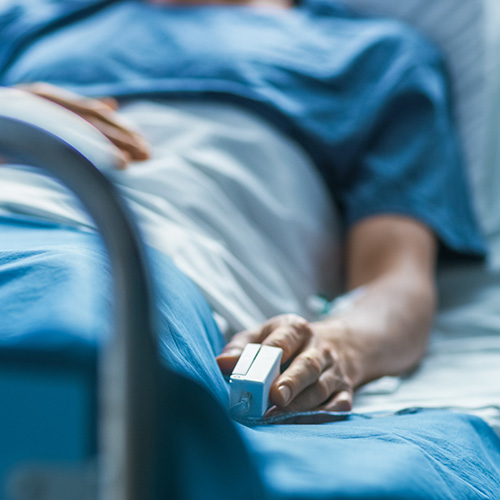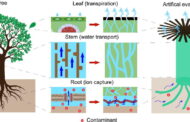
Smart bed sensors embedded in hospital mattresses could stop pressure sores.
Tiny smart bed sensors embedded in hospital mattresses could put an end to painful and potentially life-threatening pressure sores, thanks to new technology developed by the University of South Australia.
UniSA scientists have designed minute optical fibre sensors, which can be attached to the upper surface of a mattress to monitor movement and record heart and respiratory rates.
The unobtrusive sensors can detect when a hospital patient turns over, leaves a bed, or just remains motionless, picking up their breathing.
Nurses can therefore be remotely alerted if a patient has not moved within a couple of hours, prompting them to adjust the patient’s position.
Lead researcher Dr Stephen Warren-Smith says the technology could “significantly relieve” the burden on hospital staff having to constantly monitor patients for pressure sores.
“Each year, thousands of older Australians in hospitals and nursing homes experience pressure injuries, or ulcers, which take a long time to heal and can be fatal,” Dr Warren-Smith says.
“At the very least these injuries can cause severe pain, disrupt sleep, affect their mood as well as their rehabilitation, mobility and quality of life.”
Unlike the sensors that many people wear on their wrists to monitor physical activity and physiological signs, the optical fibre sensors are embedded in the same space as a person, but not on them physically.
Hospitals currently use weight-based sensors or cameras installed in the room to monitor patients, but both have limitations, Dr Warren-Smith says.
“Existing weight-based hospital sensors cannot predict when a patient leaves the bed until their feet touch the floor, leaving little time for nursing staff to respond in the event of a fall. Also, there are privacy issues with camera-based technology.”
The optical fibre sensors are sensitive enough to record heart and respiration rates and can detect whether a person is in the bed, even if they remain stationary for long periods.
“Respiration rates are often the first sign that a patient is deteriorating. This normally requires devices to be attached to the patient, either on the chest, as a mask on the face, or ventilator. These can be restrictive and sometimes inappropriate in an aged care setting.
“Monitoring vital signs continuously, unobtrusively and cheaply via the mattress-embedded sensors is a far better solution for both patient and nurse,” Dr Warren-Smith says.
The technology is explained in a recent paper published in the Journal of Biomedical Optics
Original Article: Tiny optical sensors could put an end to hospital bed sores
More from: University of South Australia
The Latest Updates from Bing News
Go deeper with Bing News on:
Smart bed
- Snooze-worthy selections: The 20 best kids’ beds to make bedtime fun
It’s bedtime! We mean it — getting your little one tucked into bed at night is not always a simple task. However, with the right bed frame, plush mattress, and silky bedding, you may end up getting ...
- Why the smart money is buying single-family homes
If you’ve got the financial fitness to jump into the single-family home arena, playing the waiting game for ‘lower prices’ or ‘lower rates’ is a pure gamble. Lots of other folks are doing the exact ...
- Some Quebec hospitals are freeing up beds with virtual health care
A new virtual care project launched at a handful of Quebec hospitals allows patients to return home early while being monitored remotely through smart devices.
- German Shepherd’s Refusal to Go to Bed Is Just Like a Human Kid
German Shepherds are one of the most popular dog breeds around and known for being protective guard dogs. They are also used by law enforcement as K-9s. Do they make good family pets? As with any ...
- Strong, Smart, Bold: Girls Inc. holds annual fundraising gala
Community members came together Friday evening at the Pines Evergreen Room in Seymour in an effort to not only raise money for Girls Inc., but to remind women to be strong, smart and bold.
Go deeper with Bing News on:
Hospital bed sores
- Grieving mother calls for better mental health services in Karratha after son's suicide
A Pilbara mother says her son, who took his life at 21, would still be alive if he'd been able to access the mental health care he needed.
- Maryland Appellate Court: Registered Nurses Shouldn't Be Barred From Serving as Proximate Cause Experts
finding the lower court erroneously held that a registered nurse with relevant experience was not qualified to provide an expert opinion on prevention and treatment of bed sores. On appeal from the ...
- Agency won’t disclose payment status of $5.7 million in Iowa nursing home fines
Last year, the federal government imposed 244 fines totaling $5.7 million against Iowa nursing homes, but it won’t say which of those fines remains unpaid. Federal data show that just five of Iowa’s ...
- Tourist clawed by bear on Romanian road after stopping for photo
A Scottish tourist was clawed by a bear after it climbed into her car window on a Romanian highway Monday — but still managed to snag a shot of the not-so-friendly fur ball before it slashed her arm.
- Oxygen therapy helping cancer patients
Hyperbaric Oxygen therapy helps patients with hard-to-heal wounds by providing them oxygen-rich plasma to damaged tissue and helps the wound heal faster. After going through radiation therapy for ...







